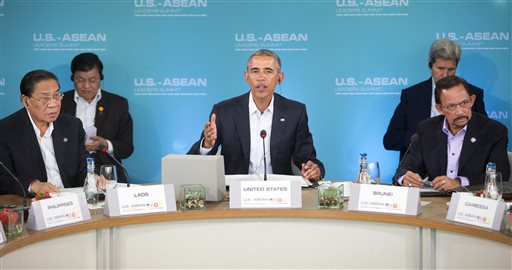Obama, Southeast Asian leaders seek united front on China

President Barack Obama, center, speaks at the plenary session meeting of ASEAN, the 10-nation Association of Southeast Asian Nations, at the Annenberg Retreat at Sunnylands in Rancho Mirage, Calif., for Monday, Feb. 15, 2016. Sitting with Obama are Laos’ president, Choummaly Sayasone, left, and Brunei’s sultan, Hassanal Bolkiah, right. (AP Photo/Pablo Martinez Monsivais)
RANCHO MIRAGE, United States — President Barack Obama and Southeast Asian leaders will discuss Tuesday a common response to a key United Nations court ruling on China’s island-building when they meet in the United States.
The White House, betting that China does not want to be seen as a regional bully, has mustered an informal coalition of Pacific allies to demand that Beijing respect the rule of law.
Obama is hoping to secure a united front against China’s territorial ambitions as the US hosts representatives from 10 Asean countries at Sunnylands.
The secluded, sprawling California desert retreat has been beloved by US presidents since Dwight Eisenhower.
The UN’s Permanent Court of Arbitration is expected to decide in April or May whether China’s claim to a vast expanse of sea inside a “nine-dash line” has legal merit.
China has also increased its military presence in these areas subject to myriad territorial claims.
A collective US-Asean endorsement of the court’s verdict — whatever the outcome — would heap pressure on China, which refuses to recognize the court.
They “hope that, if not immediately, then over time, the Chinese will not want to be isolated and an international pariah, a country that doesn’t agree with international law,” said Ernest Bower of the Center for Strategic and International Studies.
Hoping to increase pressure on China over land grabs in the South China Sea, Obama opened the meeting by declaring a US-Asean “shared goal of building a regional order where all nations play by the same rules”.
The White House sees this summit, and the prestigious venue, as an opportunity to champion Obama’s “pivot to Asia” and Asean’s growing importance, before the president leaves the White House in January 2017.
“As president, I’ve insisted that even as the United States confronts urgent threats around the world, our foreign policy also has to seize on new opportunities. And few regions present more opportunity in the 21st century than the Asia-Pacific,” Obama said.
“That’s why, early in my presidency, I decided that the United States, as a Pacific nation, would rebalance our foreign policy and play a larger and long-term role in the Asia-Pacific.”
Strong pushback
The summit comes as Asean and US officials report increasingly strong pushback from Beijing, which is using diplomatic and economic muscle to weaken criticism.
Officials say Cambodia and Laos — two Asean countries that have no claims in the South China Sea — are coming under particular pressure to break ranks.
Those countries are also the destination for large flows of Chinese investment.
“The message is ‘fall in line, or else,'” said one Southeast Asian diplomat. “China has leverage.”
But some see signs that pressure is beginning to backfire — forcing ASEAN countries to turn further toward the United States. That is something Obama will hope to capitalize on at Sunnylands.
In Myanmar, Beijing’s long-held influence waned as military leaders feared becoming overly dependent on China, opening the way for better relations with Washington.
Myanmar’s outgoing leader Thein Sein was not set to be at the summit.
He decided to remain at home as talks inside the regime intensify over whether to change the constitution to allow Aung San Suu Kyi to become president.
Vietnamese Prime Minister Nguyen Tan Dung did attend, after initially canceling amid a power shakeup within Vietnam’s ruling Communist Party.
At home, Obama’s latest effort to champion his pivot is likely to be overshadowed by the death of Supreme Court Justice Antonin Scalia.
But the White House will hope to at least send a message to the region that Washington will remain engaged.
“It’s the first time we have hosted ASEAN leaders here in the United States for this kind of meeting,” said National Security Advisor Susan Rice.
“That we have succeeded in doing so reflects a return on seven years of significant and sustained investment by this administration and by President Obama personally.
“It demonstrates our enduring commitment to this vital region.”
Presidential trips to Vietnam and Laos are expected later this year to reinforce the point.
The White House said Obama would visit Vietnam in May when he travels to Japan for the G-7 Summit.
RELATED VIDEO

RELATED STORIES
Obama welcomes Aquino for US-Asean summit
Obama, Asean leaders likely to issue joint statement at end of summit